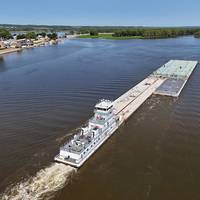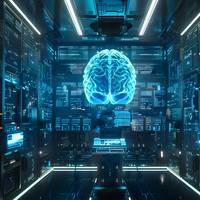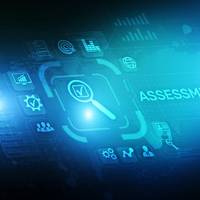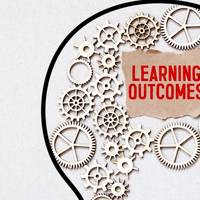Training Tips For Ships News
Near Miss Reporting – Training Mariners to Speak Up

Whether it’s an unsafe working condition, an equipment failure, or a concern about a colleague’s competency, mariners must feel empowered to voice concerns without fear of retribution. For all the training you invest in, nothing is more important than a mariner using their intuition and instincts, refined over a lifetime at sea, to recognize and act on potential dangers.One way the industry has encouraged this is through Near Miss Reporting, a process meant to catch safety hazards before they turn into incidents.
Tip #60 - AI & Maritime Trainers ... "Watch Your Back ... " [Part II]

Training Tips for Ships [#60]Last month’s Training Tips for Ships discussed the role of Artificial Intelligence (AI) in the future of maritime training. My thoughts on this were triggered by the recent headline in the Financial Times: “Andreessen Horowitz raises $7.2bn and sets sights on AI start-ups“. Andreessen Horowitz is one of Silicon Valley’s most prominent venture capital firms and they are seeing fit to deeply invest in the burgeoning AI revolution. Typically, this means change is upon us on a timescale that is now very meaningful to us.
Training Tips for Ships: Embracing Technology

Tip #49 - Embracing Technology for Effective Maritime TrainingThe maritime industry, like so many others, has experienced a wave of technical advances in recent years. These changes have opened new doors for enhancing the quality of training and skill development for maritime professionals. In this edition of Training Tips for Ships, we'll consider how incredibly far we have come and explore how embracing technology can lead to more effective and efficient maritime training.Digital technologies have been making their way into maritime training, especially over the last two decades.
Training Tips for Ships: Empowering Seafarers with AI

In the maritime industry, seafarer safety and professionalism are critical to ensuring smooth operations and minimizing risks. As technical advancements continue to reshape every industry including ours, large language models like ChatGPT and Bard have the potential to directly assist seafarers in performing their duties more safely and professionally. So, how can a seafarer leverage these tools to enhance their onboard performance? Let’s look at some examples.One example is in providing instant, human-readable access to regulations and guidelines.
Traing Tips for Ships - Tip #45: Is it ‘Real’ or is it … (Part II)

Is the “old” way of generating maritime training content about to be disrupted? Are we witnessing the beginning of a sea change in the creation of training content and potentially in how trainees interact with that content?In the previous edition of Training Tips for Ships, we introduced ChatGPT and discussed its potential uses and limitations in a maritime training capacity. In fact, as was revealed near the end, most of that article was written by ChatGPT itself - providing evidence of its ability to generate content.
Training Tips for Ships: Is it ‘Real’ or is it …

We’ve all been hearing so incredibly much about ChatGPT - its abilities, limitations, potential, promise and risks. So, let’s talk about it as it relates to maritime training.ChatGPT is an application developed by OpenAI that can generate human-like text. It uses deep learning algorithms to understand and generate text and can be fine-tuned to specific tasks such as language translation, question answering, and text summarization. It can be used to generate a wide variety of text-based content, including articles, stories, and instructional materials.What does this mean for training content?
Training Tips for Ship: Maritime Skills: Who Trains? Who Assesses?

Assessment is a special interest of mine, and it should be at or near the top of the list for anyone involved in maritime training. Why? Two reasons. First, because it is arguably more important than the training itself. And second, because in my experience most training administrators pay 95% of their attention to training, and only 5% to assessment. This means that assessment is often done poorly. So let’s turn our attention to some essential tips for assessment in maritime training.This article presents one simple…
Training Tips for Ships: Choosing e-Learning Media ... It’s All About Outcomes!

In the previous edition of Training Tips for Ships we discussed the choice of media for learning materials and which media would lead to the best results. Is it text? Images? Videos? Interactive exercises and simulations? All too commonly it is claimed that interactive media with fancy (and expensive) graphics will produce better learning outcomes. The reality is not nearly so simple. So, how do we choose? It’s not hard.The first question we should be asking is not one of media choice, but instead is one of learning outcomes. Do we want the trainee to internalize some knowledge or a concept?
Training Tips for Ships: Are Mariners Knowledge Workers?
What is the difference between knowledge and skills? Which should we focus more on in our training, and how does one influence the other?When we think about the most important mariner quality, often the first thing that comes to mind is skill. Can the officer or crewmember safely perform the skills required of him or her? After all, if everyone performs their necessary skills correctly, what more is there?There is, in fact, much more. Let’s see what the experts have to say:“A study by the U.S.
Training Tips for Ships - Tip #24: For your Disaster Recovery Plan, Hope for the Best; Plan for the Worst
Very few people live day-to-day expecting a disaster. However, disasters do happen and a critical component of business continuity is ensuring that when disaster strikes, our critical systems are returned to normal operations as quickly and efficiently as possible. Last month’s training tips for ships discussed a catastrophic fire that occurred in France last month at one of the world’s largest data centres. This fire took millions of websites offline including the Learning Management System (LMS) for one of the world’s largest cruise lines.
Training Tips For Ships - Tip #23: Is Your Training Technology Disaster-Ready?
A customer once told me that they had just completed a business continuity analysis and had identified their LMS as their second most mission-critical technology - second only to payroll! Take a moment to consider how much you rely on training technologies to sustain your operations and compliance. How long could you comfortably go without your employees having access to training? How long could you go without access to your compliance records or your employees’ certificates?
Training Tips for Ships - Tip #20: Training in the Age of Data
As we greet 2021, it seems fitting to address a “big” topic - a topic that is ultimately going to change everything, including (and perhaps especially) training. The topic is “big data”. The goal of today’s Training Tip for Ships is to get us thinking about big data in training. If we understand it, we can lay the groundwork to take advantage of it.We are in the data age – and this is especially important for training. Everything we do can be done more efficiently and more effectively by understanding it more deeply.
Training Tips for Ships - Tip #19: Assess Always
In last month’s Training Tips for Ships, we spoke about the value of creating a culture of learning. Even though many organizations have yet to achieve a healthy learning culture, the concept itself is not controversial. The value is self-evident and universally understood.This month, we go a little further to discuss a culture of assessment. And while some readers may bristle at the idea of near-ubiquitous workplace assessment, the idea is a natural consequence of implementing a culture of learning. How can a culture of learning be shown to be effective if we do not assess? It cannot be.
Training Tips for Ships - Tip #18: Creating a Culture of Learning
We all think about how to train to produce better outcomes – because better training outcomes mean better performance, safer operations, and employees who are more engaged and more satisfied. But there is a much “bigger picture” goal that only the most thoughtful of maritime organizations work to achieve. That goal is to create a “culture of learning”.It is a little hard to express a concrete definition for a culture of learning, but it is amazing how clear and powerful it is when you experience it.
Training Tips for Ships Tip #17: Getting Serious About Assessing Skills
Ours is both a knowledge-based and skill-based industry. We know this. Yet our training does not address both aspects equally. And until it does, we are needlessly sacrificing safety and performance. There is more we can do.Maritime workers require a high degree of both knowledge and skills to perform efficiently and safely. Knowledge enables officers and crew to react intelligently to novel situations and to operate safely in challenging environments. Yet knowledge, while necessary, is not sufficient for safe and performant operations.
Training Tips for Ships #16: Using Student Exam Results to Measure OUR Performance: Part 2
In last month’s Training Tips for Ships, we began the discussion of how we can look at our existing training data to measure our success as trainers and training organizations. The data in question are the results from the multiple-choice exams we deliver to our trainees. We deliver these exams all the time, and we gather a tremendous amount of data (answers) over the years. Yet typically we only use that data to determine whether our trainees have gathered the knowledge we are trying to impart. There is so much more we can do.
Training Tips for Ships #14: Collect, Analyze Data to Improve Training
As I wrote in last month’s Training Tips for Ships, “If you do not measure it, you cannot manage it. This is especially true with training because the inputs (the training provided) are often far removed in time and apparent direct causality from the key output (performance). Therefore, it is important that we measure everywhere we can”.To address this problem, we discussed the value of student evaluations of their learning experiences and included some advice on best practices for their delivery. But typical student evaluations are just the beginning.
Training Tips for Ship #13: How's Your Training? You Can't Know Unless You Ask!
We have all heard it a thousand times: “If you do not measure it, you cannot manage it”. This is especially true with training because the inputs (the training provided) are often far removed in time and apparent direct causality from the key output (performance). Therefore, it is important that we measure everywhere we can. One universal form of measurement is the requirement for exams at the end of the course. But why stop there when there is much more to easily be learned,…
Training Tips for Ships: Taking the Stress out of Tests
We must assess our trainees. Yet we have all heard the complaints they raise about assessments: “I am a bad test-writer”, “this test was much more difficult than I expected”, “I know the material but I did not understand the questions”, “I was nervous, and my mind went blank”, etc.These are not the occasional concerns of weak or lazy trainees – they are the norm. And we must listen because our trainees are telling us that we cannot rely on our assessment results as an accurate reflection of what they know.
SQLearn, PAS Launch Sulfur Cap Course
SQLearn and Prevention at Sea (PAS) have launched the new innovative e-learning course “IMO 2020 Sulfur Cap”The Greek e-learning solutions provider said: "This is the one-time stop to learn everything that IMO requires to achieve compliance with the IMO 2020 Sulfur Cap Legislation."The e-learning course covers all the aspects of the IMO 2020 Sulfur Cap Regulations and gives you the deepest knowledge on the upcoming maritime changes defined by IMO and strictly implemented on January 1st, 2020.This course uses innovative technology and extensive analysis on the new regulations so that you can precisely be trained to meet the requirement…
Training Tips for Ships: Taking the Stress out of Tests
We must assess our trainees. Yet we have all heard the complaints they raise about assessments: “I am a bad test-writer”, “this test was much more difficult than I expected”, “I know the material but I did not understand the questions”, “I was nervous, and my mind went blank”, etc. These are not the occasional concerns of weak or lazy trainees – they are the norm. And we must listen because our trainees are telling us that we cannot rely on our assessment results as an accurate reflection of what they know.
